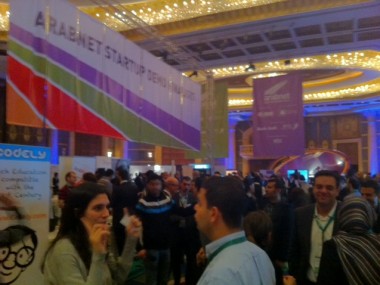Notes From ArabNet
 The following dispatch was written on March 29, day one of the third annual ArabNet Digital Summit.
The following dispatch was written on March 29, day one of the third annual ArabNet Digital Summit.
If debates rage about the meaning of the past year in the Middle East, one would not sense much doubt among over 1,000 young regional entrepreneurs and early stage investors gathered here in Beirut. Their message is clear: There is no turning back, and the demographically young, wired, connected new generation in this region plan to take business opportunities into their own hands.
ArabNet Digital Summit is the brainchild of Yale MBA and Lebanese entrepreneur Omar Christidis. His vision has remained throughout to create a hub of shared ideas, experiences and connections among the nascent but rapidly growing start-up communities throughout the Middle East. Innovators from 22 countries are networking, competing in start-up competitions and participating in sessions familiar to any entrepreneur in the United States — e-commerce, big data, mobile, the cloud and social networks — but with sensitivity to local and regional opportunities as yet untapped.
Saad Khan, one of the few American VCs here, is a young veteran of Silicon Valley — having been a part of one of the world’s first incubators at Garage.com (which launched Pandora) and now at CMEA Ventures (where he sits on Blekko’s board). He has travelled extensively throughout the region over the last two years, and he believes that something pivotal is happening in the Middle East. “This is not about looking for ways to transport Silicon Valley here,” he notes, “MENA is a different market. Building connections with tech smart people in the Valley is great — shared, reciprocal learning both ways can be more powerful. Mobile is on fire in this region, everyone has a cellphone and smartphone penetration is deploying rapidly as pricing has dropped. Look for mobile innovation here to come from MENA, even leap-frogging the US.” He adds that some of best innovations in the cloud computing and ad analytics (like Cloudera, Revenue Science, AdMob and Bre.ad) are coming from Arabs and Arab Americans connected to the States and globally.
Moderator Alex Tohme, entrepreneur and Digital Strategist for Ogilvy One in Dubai, argues that while she prefers to run a company with the team under one roof, technology facilitates connections among skills around the region. “My ideal start-up would have tech engineers from Jordan, creatives from Egypt and have Lebanese sell it,” Alex Tohme notes. “ArabNet is great, as we’ve all connected regularly online over the last year and can meet here in real life. Talent is in many places, and many ‘hubs’ will spring up and connect with each other.”
Many of the more successful start-ups at ArabNet are regionalizing/arabizing ideas that have worked elsewhere in English. In fact, some of the leading competitors at the start-up demo competition would be familiar to the western world. Cinemoz announced significant business development partnerships with the best in Arabic TV and movie content, creating a Hulu for the region. ReserveOut is a fast-growing reservation-booking and backend for restaurants and spas similar to OpenTable. Arab Rooms allows business travelers in Saudi and beyond to find cheap, clean and convenient rooms somewhere between a Hotels.com and an AirBnB.
Habib Haddad is a Lebanese entrepreneur who created the first Arabic translation search engine, Yamli, and has created wamda.com in Beirut as the cornerstone of an entrepreneurial ecosystem of breaking information, education, research and angel investing in the region. He believes that such “copycats” are a great thing. “The Middle East and Arabic market is huge, has perfect demographics and has hunger for services for them on their terms and in their language. As success breeds success, more innovation will follow.”
Panelists and participants concur universally that the mere act of creating content and services in Arabic offers significant opportunity. Surveys have shown that over three quarters of Internet users in the region would prefer content in the Arab language, yet a tiny fraction of content online is currently in Arabic. Barry Newstead, Chief Global Development Officer for Wikimedia Foundation, noted in his talk here that on Wikipedia there are over 22 million individual articles in 280 languages. Only 100,000 are in Arabic. Denmark alone has over 200,000.
Rob Kniaz, General Partner of Hoxton Ventures out of London, who specializes in early investments in emerging markets, told me that Arabizing the web not only creates services to large markets who wish to have them in their own languages, but also opens up new, now-dormant business opportunities. “Local, Arabic advertisers have nowhere to go, so aggregate dollars are small and ad CPMs can be a few cents. Think of the pent-up demand over time as this is addressed by more Arabic content,” he notes.
Demo Competition winner May Habib founded Quordoba first as a B2B platform for businesses to outsource translation needs online, creating a network of over 400 vetted translators, many with industry expertise, to turn around documents in a matter of hours. But rapid demand is now also coming from English consumer media companies looking to reach Arabic audiences — and not only book publishers, but authors themselves, want them to both translate and distribute their books digitally and offline in the Middle East.
There is plenty of grumbling about infrastructure issues at this gathering — each country with its own challenges of logistics, delivery and regulation. But there is a special place of frustration among attendees over mobile broadband quality and cost. During a panel with executives from some of the region’s telecom giants, many participants drilled into the quality of services, the scaleability of capabilities as more smart phones come on board, and the access charges that are high by any global standards. The Twitter feed of #ArabNetME retweeted themes like, “Only Skype matters” while the executives also described their hopes for expansions into 4G and beyond.
But many entrepreneurs find opportunity in infrastructure weakness. Rasha Khouri, Lebanese Palestinian founder of diaboutique.com and dia-style.com — the largest growing fashion and e-commerce website that allows global access to some of the most innovative and hard to find fashion brands — noted: “I’m very impressed with the number of start-ups here trying to solve issues we face infrastructurally. More efficient online banking, mobile charging, billing, teaching advanced computer skills. Some of these aren’t necessarily ‘innovation’ as in ‘new technology’ — but critical for innovation to flourish.”
Jordanian entrepreneur and competition finalist Fouad Jeryes could not agree more. He co-founded Codely as the first fully online education platform for schools to teach specific programming and tech skills to high-school age kids, offering supplemental but often unique educational opportunities. “We surveyed kids and asked them what computing skills were all about and most said ‘Facebook,’ or ‘a way to play games’ or ‘secretarial skills.’ Our programs not only teach skills but create awareness of whole new worlds they really never have understood existed for them. We are lighting a fire in kids minds to make this understanding real. I believe we will help create the next generation of entrepreneurs in the Middle East, and eventually completely globally.”
Regional venture capital — from the Arab world and Turkey — is hovering closely over the ArabNet attendees. Egyptian VCs Sawari Ventures and Amman incubator Oasis 500, some of the most active regional investors with nearly 50 investments last year, split their time equally here with portfolio companies and looking for new investments. Middle East Ventures announced five new investments from the stage, including two follow-ons in music, job discovery, gaming and mobile payments. Noted Oasis 500’s Salwa Katkhuda, “I came with good expectations to be about the same as last year. But so much more is going on now in the region in terms of start-ups funded, a few success stories, more VC funds and so on.”
Will western investors be far behind? Saad Khan notes with conviction: “The answer to what will happen in five years is in the hands of the people in this room, period. And wins tend to beget wins.” He likes what he saw at ArabNet.
Christopher M. Schroeder @cmschroed is a U.S. Internet entrepreneur and angel investor. His most recent company, the social and content online health platform healthcentral.com, was acquired in December 2011. He has been active in following entrepreneurship in emerging markets, especially in the Middle East, and has written for AllThingsD on these experiences.














